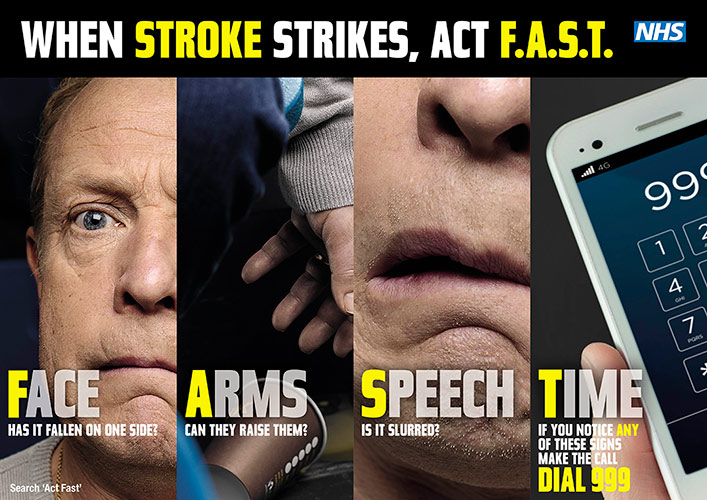Dyfi Valley Health, Bro Ddyfi Community Hospital, Heol Maengwyn, Machynlleth, Powys, SY20 8AD
contact.w96011@wales.nhs.uk 01654 702 224Dyfi Valley Health, Bro Ddyfi Community Hospital, Heol Maengwyn, Machynlleth, Powys, SY20 8AD
contact.w96011@wales.nhs.uk 01654 702 224
We all know that stroke is a sudden and devastating illness – however many people are not aware of its widespread impact. According to the Stroke Association (http://stroke.org.uk), there are around 150,000 strokes in the UK every year. That is more than one every FIVE minutes!
It is, unfortunately, one of those illnesses where the prevention, although often difficult, is much better than the consequences…
Firstly, what is a stroke?
Like all organs, the brain needs the oxygen and nutrients provided by blood to function properly. If the supply of blood is restricted or stopped, brain cells begin to die. This can lead to brain injury, disability and possibly death.
There are two main causes:
Certain conditions increase the likeliness of having a stroke, including:
There is no easy way around it. If you’re at a higher risk of a stroke, you’re going to have to make some life changing habits – possibly habits you have been putting off for quite some time..? Here are a few things you need to do:
Try doing the following to lower your blood pressure:
It is quite simple, in theory: eat less, eat healthily and increase your activity levels… Which leads us onto point 3:
Try to exercise to a moderate level for five days a week and for 30 mins a day. If you don’t know the best ways to get active, check out our blog on How to get started: http://www.dyfivalleyhealth.org/exercise-how-to-get-started/
Other tips:
If you drink then do it in moderation.
Smoking accelerates clot formation in a few ways. It thickens the blood and it increases the amount of plaque build-up in the arteries.
There are many ways to quit smoking. We are always happy to help you with advice, support and information – speak to someone in the pharmacy or one of the nurses. For now, check out the NHS guide (https://www.nhs.uk/live-well/quit-smoking/10-self-help-tips-to-stop-smoking/).
The signs and symptoms of a stroke vary from person to person, but usually begin suddenly.
As different parts of your brain control different parts of your body, your symptoms will depend on the part of your brain affected and the extent of the damage.

The main stroke symptoms can be remembered with the word F.A.S.T.:
It’s important for everyone to be aware of these signs and symptoms, particularly if you live with or care for somebody in a high-risk group, such as someone who is elderly or has diabetes or high blood pressure.
If you need help with any of the points we have mentioned in the blog, please contact us and we will be happy to help you!
Useful Links: